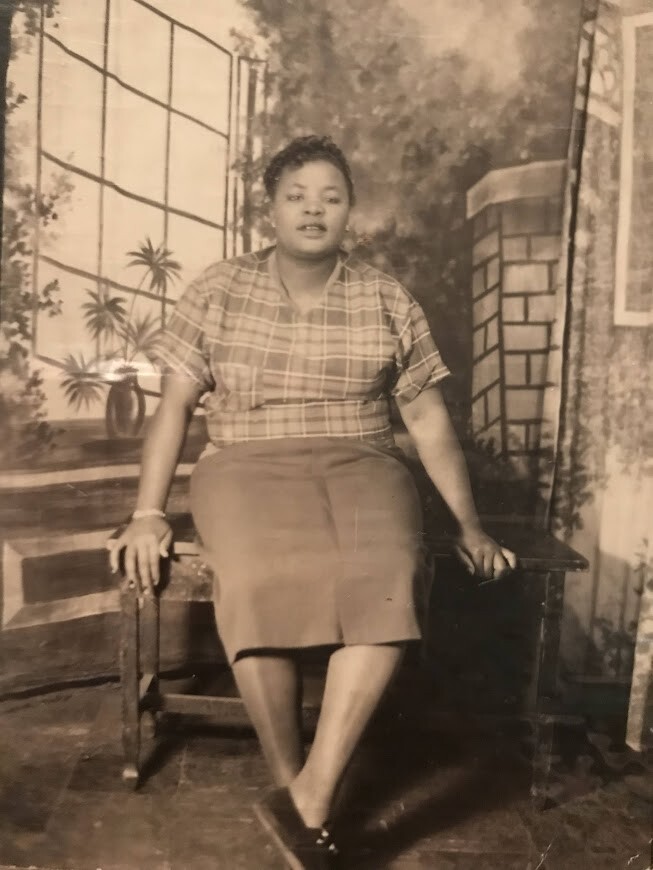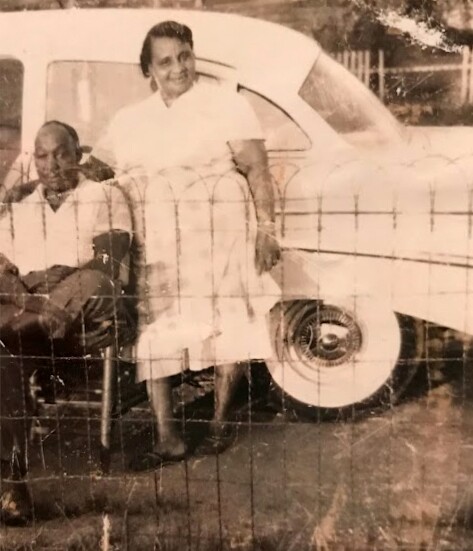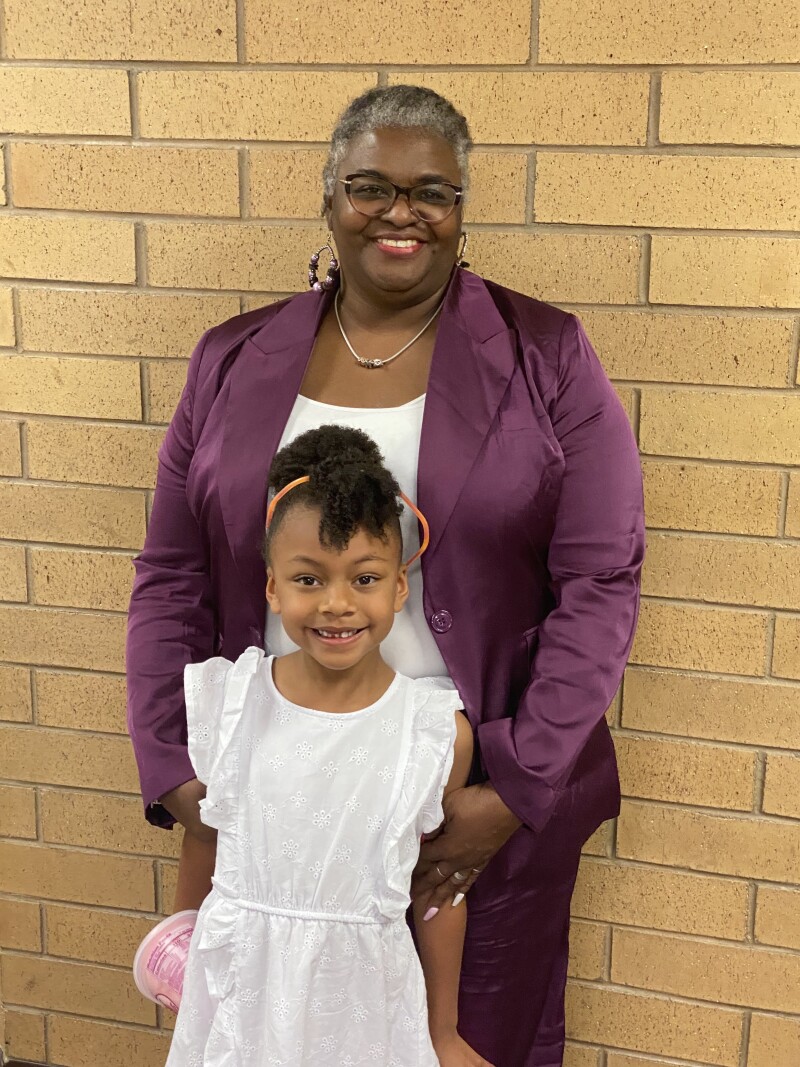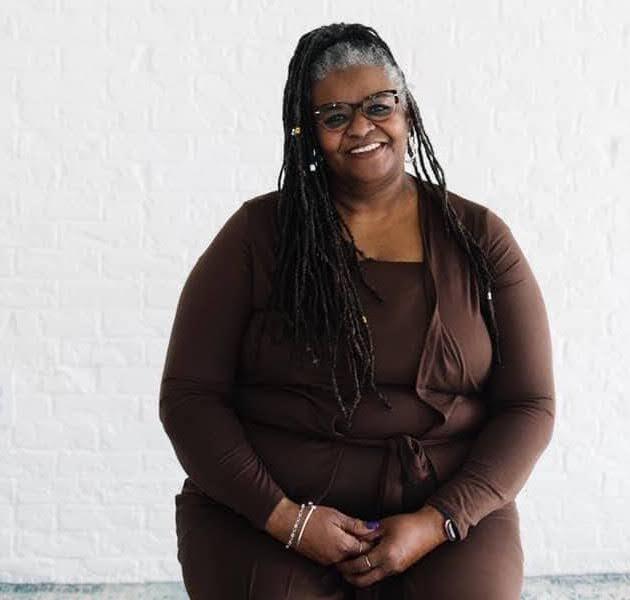Editor’s note: This article references a suicide attempt and other mature themes, and reader discretion is advised.
Every night as a young girl, when the front room turned into a shared bedroom, Marcia Neely-Be’y listened to her grandmother pray. And every morning before the sofa bed was folded up again, she again heard the familiar voice of her grandmother—the woman who had adopted Marcia as her own—as she spoke with God.
“She would just talk to Him and tell Him what was going on, and who she needed Him to watch over, and who she needed Him to bless, and who was sick and who needed something. And from that, I learned that there was a God. From that, I learned that I could talk to Him. From that, I learned that I wasn't alone—that He did watch over me, that I had a Father who loved me and cared for me,” she says.

It wasn’t just in the morning and at night that Marcia heard her grandmother talk to God; she heard her communicate with Him throughout the entire day about her children, grandchildren, neighbors, and friends—and that example changed her life. And so, during the highs and lows that followed for Marcia, including joining The Church of Jesus Christ of Latter-day Saints, becoming a mother and grandmother, losing the will to live, and being in two difficult marriages, she knew that God would take care of her. Because just like her grandmother before her, she knew that she could talk to Him.
And she knew that He would listen.
Angels
Born in Queens, New York, Marcia was only four years old when her maternal grandparents took her in due to the death of her mother, whose life was taken at the hands of Marcia’s father. Marcia would later be officially adopted by her grandparents, who lived in the small mining community of Docena, Alabama. There in the deep South, located about 10 miles outside of Birmingham, her community was the kind of place, Marcia says, where everybody knew each other—or on the off chance that they didn’t know you, they at least knew your family.

Though her grandfather wasn’t religious, Marcia’s grandmother, Sarah Williams (whom Marcia knew as “Mama”), was a devout Baptist. With that came certain expectations: Marcia had to learn the piano because it was a skill that would help her get a job at church if she ever needed one, and it was required that she attend church every Sunday. Marcia also knew the scriptures well.
“[Mama] couldn’t read the Bible, … so she’d have me read it for her,” Marcia says. “She learned from going to church and listening to the ministers and the things that they taught. And she was faithful. She knew there was a God. She knew that He knew everything about her—that He loved her. That he watched over her.”
But even without her grandmother’s urging, Marcia became interested in religious things at a young age: When she was just 12 years old, she watched Baptist ministers like Billy Graham and often sought out religious books in order to “learn all I could about God and what He wanted for me and what He expected of me,” she says. She also started developing her own relationship with God and prayed earnestly that her grandmother, who was well into her 60s when she took Marcia in, would be able to live to see the major moments of Marcia’s life.

“I said, ‘Lord, if you just let Mama live until I graduate from high school, I promise I’ll be good. I’ll do everything I’m supposed to do. I’ll keep the commandments. I’ll go to church. I’ll play the piano. I’ll do whatever you want me to do if you just let her live until I graduate from high school,” she says. “That was a bargain that I made. And I made that bargain again when I turned 18, that she’d live long enough to see my children. And you know what? She did.”
But while faith was a major part of her life, Marcia also faced dark times as a youth and attempted to end her life by taking an entire bottle of pills when she was 16 years old. However, right as she had done so, her friend came through the back door of Marcia’s house. Noticing that Marcia didn’t look well, her friend asked after her—but Marcia avoided giving a straightforward answer. It wasn’t until Marcia thought nothing could be done that she told her friend the truth. Fortunately, her friend immediately took action, and Marcia received the help she needed. In retrospect, Marcia says God must have been aware of her during that difficult time, as her friend hadn’t come over for any particular reason other than the fact that Marcia had been on her mind.
“She was my angel that day, when I really needed one. It was proof to me that God was aware of me and what I was feeling, what I was struggling with. It also led me to believe that I had a purpose—that God had something that I needed to do. I knew that He sent her to save me,” Marcia says.
But as she became a young adult, Marcia lost interest in going to church or praying as she once did, and so she stopped regularly attending the Baptist church. And when she felt that interest in spiritual things once again, she had begun turning toward another faith altogether—The Church of Jesus Christ of Latter-day Saints.
An Open Heart
Religion wasn’t on Marcia’s mind much when she was in her twenties—in addition to marrying and having three biological children, she was taking care of two of her sister’s children after she passed away in 1988. But Marcia happened upon a copy of the Book of Mormon one day while visiting her children’s grandmother’s house, and she asked about it.
“She didn't know [what it was],” Marcia recalls. “She said some boys gave it to her and I could have it.”
So Marcia brought the Book of Mormon home with her and started to read. But as soon as she came across the phrase “and it came to pass” in 1 Nephi, she was too scared to keep going—recognizing the phrase from the Bible, she was unsure whether the book was of God or of the devil. So she put it away for good and decided that was that.
Or so she thought—not long afterward, the missionaries showed up at her door.
“I’d never seen them before in my life,” she says. “And all of a sudden here they were at my door, wanting to share a message with me.”
Although she let the missionaries in that day, Marcia wasn’t ready to join the Church right away and resisted praying for some time. She also wasn’t prepared to give up her habit of smoking cigarettes.
“I just wasn’t ready to do that. I wasn’t ready to commit,” she says. But there were certain truths of the gospel, such as a premortal existence and the veil, that she had always believed personally but had never heard anyone teach before. Since those doctrines resonated with her, she decided to turn to God in prayer. “When I prayed about it, I got a sure witness of what I was supposed to do,” she says, referring to baptism.
But there was just one tiny problem—she had to tell Mama, who had been asking Marcia for some time if she’d been going to church. For years, Marcia had responded that no, she hadn’t been. But that had all changed now that she was attending The Church of Jesus Christ of Latter-day Saints. Marcia began praying that her devout Baptist grandmother would be receptive to her decision to join a different church, and as they visited with each other one day, Mama asked Marcia once again if she had been attending. This time, Marcia responded that she was. When her grandma simply said that was “good” and never asked which church she was attending, Marcia knew that her response was an answer to prayer.
“All that mattered to her was that I had a relationship with God, that I was attending church and taking my kids. She didn't care which church I went to. I knew that God had softened her heart and opened the way for me to do what I knew I had to do,” she says.
So on February 3, 1990, when she was 27 years old, Marcia was baptized. Eager to share the gospel with others, she found great joy in her renewed relationship with God—and in the difficult times that followed, she would rely on that relationship to give her the strength she needed to keep going.
“God Is Good”
Marcia was just months into her second marriage when she realized that her new husband was a high-functioning drug addict. When the severity of his struggles came to light, Marcia wasn’t sure how to best move forward—but she decided to love him anyway.
Over time, however, her husband’s struggles became more severe. She recalls one night in particular when he had been absent for an entire weekend, and the rain was falling down outside. While looking out her bedroom window with tears streaming down her face, Marcia poured out her heart to God; and it was in that moment of her deepest despair that she felt Him reassuring her with the promise “I will take care of you.”
Marcia felt great comfort from that promise. But she wouldn’t realize until later in life, after she had been through other struggles, that He wasn’t just promising to take care of her then—He was promising to take care of her for her entire life.
Today, Marcia has a firm testimony of the ways God has always cared for her, and she centers her life on gratitude. In fact, she is often counting God’s goodness in her life—particularly her five children, 14 grandchildren, and her job as an assistant to the managing director of dining services at Brigham Young University. And of course, she’s also grateful for the fact that she can simply breathe and move every single day.

In the Church, Marcia is grateful for the opportunities she’s had to participate in many callings. Previously, she’s been a Young Women, Relief Society, and Primary president as well as a Gospel Doctrine, Relief Society, Primary, and seminary teacher. Currently, she serves as an ordinance worker in the Provo Utah Temple. She’s incredibly dedicated to her calling: although she isn’t a morning person, Marcia wakes up at 3:00 a.m. every Saturday to get her scripture study in before her shift. While that might be a difficult commitment for some, Marcia doesn’t bat an eye about it; one of her favorite quotes from Elder Gary E. Stevenson promises that if you “stay close to the Spirit … the Spirit will stay close to you,” and so scripture study is naturally a priority for her.
Additionally, Marcia has a great love for music and is talented singer—in 2020, she was invited to be part of a multicultural choir with the Tabernacle Choir before the COVID-19 pandemic altered those plans. She’s also served as a ward chorister and continues to share her talent with those around her. When she’s not serving in the Church, Marcia is passionate about spending time with her family, who learn from her example of faithful and joyful living. And she’s even passed some of her Baptist roots on to her posterity, which her daughter-in-law Alexis Janique Bradley has seen firsthand.
“I have a six-year-old, and we’ll drive by a car accident or something, and my six-year-old will literally start praying out loud for the people in the accident. [She’ll] ask Jesus to watch over them and comfort them,” Alexis says. “She prays out loud all the time, and it kind of surprises me. But that’s what my mother-in-law does, and [my daughter is] around my mother-in-law. It’s so cute—and when good things will happen, my six-year-old will be like, ‘Thank you, Jesus.’”

That’s because, just like her grandmother before her, Marcia is teaching through her actions that one can talk to God like speaking to a friend. And so her granddaughter has learned that she, too, can thank and confide in Him anytime, anywhere.
“I’m so thankful that I can commune with my Heavenly Father,” Marcia wrote in an Instagram post. “I can talk to Him about my thoughts, questions I may have, my doubts, my fears. I can tell Him what I’m feeling: anger, frustration, loneliness, disappointment, gratitude, sadness, joy, humility. I can talk to Him anywhere: on my knees, lying in my bed, sitting on the sofa, riding in my car, on my job, in the kitchen. I can talk to Him anytime—day or night, Sunday through Monday. No matter when, no matter where, He’s always available and ready to listen.”


